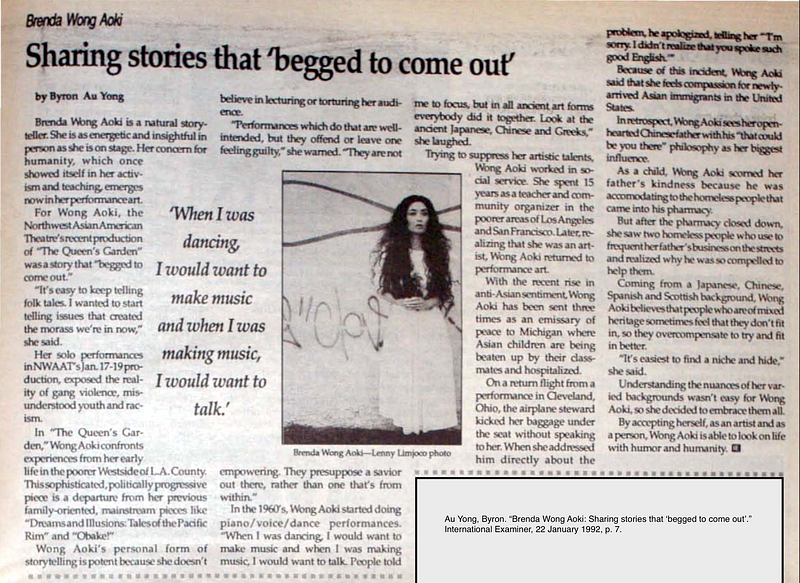Brenda Wong Aoki
Sharing stories that ‘begged to come out’

Brenda Wong Aoki is a natural story-teller. She is as energetic and insightful in person as she is on stage. Her concern for humanity, which once showed itself in her activism and teaching, emerges now in her performance art. For Wong Aoki, the Northwest Asian American Theatre’s recent production of The Queen’s Garden was a story that “begged to come out.”
“It’s easy to keep telling folk tales. I wanted to start telling issues that created the morass we’re in now,” she said.
Her solo performances in NWAAT’s Jan.17–19 production, exposed the reality of gang violence, misunderstood youth, and racism. In The Queen’s Garden, Wong Aoki confronts experiences from her early life in the poorer west side of LA County. This sophisticated, politically progressive piece is a departure from her previous family-oriented, mainstream pieces like Dreams and Illusions: Tales of the Pacific Rim and Obake!
Wong Aoki’s personal form of storytelling is potent because she doesn’t believe in lecturing or torturing her audience: “Performances which do that are well-intended, but they offend or leave one feeling guilty,” she warned. “They are not empowering. They presuppose a savior out there, rather than one that’s from within.”
In the 1960s, Wong Aoki started doing piano/voice/dance performances. “When I was dancing, I would want to make music and when I was making music, I would want to talk. People told me to focus, but in all ancient art forms everybody did it together. Look at the ancient Japanese, Chinese and Greeks,” she laughed. Trying to suppress her artistic talents, Wong Aoki worked in social service. She spent 15 years as a teacher and community organizer in the poorer areas of Los Angeles and San Francisco. Later, realizing that she was an artist, Wong Aoki returned to performance art.
‘When I was dancing, I would want to make music and when I was making music, I would want to talk.’
With the recent rise in anti-Asian sentiment, Wong Aoki has been sent three times as an emissary of peace to Michigan where Asian children are being beaten up by their classmates and hospitalized. On a return flight from a performance in Cleveland, Ohio, the airplane steward kicked her baggage under the seat without speaking to her. When she addressed him directly about the problem, he apologized, telling her “‘I’m sorry. I didn’t realize that you spoke such good English.’” Because of this incident, Wong Aoki said that she feels compassion for newly-arrived Asian immigrants in the United States.
In retrospect, Wong Aoki sees her open-hearted Chinese father with his “that could be you there” philosophy as her biggest influence. As a child, Wong Aoki scorned her father’s kindness because he was accommodating to the homeless people that came into his pharmacy. But after the pharmacy closed down, she saw two homeless people who use to frequent her father’s business on the streets and realized why he was so compelled to help them.
Coming from a Japanese, Chinese, Spanish and Scottish background, Wong Aoki believes that people who are of mixed heritage sometimes feel that they don’t fit in, so they overcompensate. “It’s easiest to find a niche and hide,” she said. Understanding the nuances of her varied backgrounds wasn’t easy for Wong Aoki, so she decided to embrace them all. By accepting herself, as an artist and as a person, Wong Aoki is able to look on life with humor and humanity.
Original interview published in the International Examiner, Vol. 19, № 2, on January 22, 1992, page 7. See IE Archives at iexaminer.org/archives
